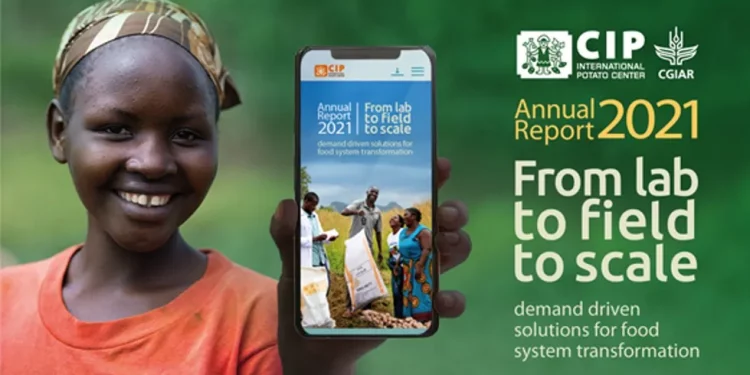The Lima-based International Potato Center’s (CIP) work to reduce hunger and malnutrition, boost farmer resilience, and catalyze income improvements generated benefits for men and women in more than 30 countries last year.
To communicate some of those achievements and give people a sense of how CIP harnesses science to improve lives and livelihoods, the organization included varied examples in CIP’s Annual Report 2021: From lab to field to scale, which is now available online here.
Its success stories include partnerships to ensure more farmers benefit from the agrobiodiversity safeguarded in the CIP genebank; CIP-developed software that facilitates the prediction and better management of crop pests under climate change; and collaborations that are increasing access to robust, resilient and nutritious potato and sweetpotato varieties.
The report illustrates how CIP shares innovations and knowledge that improved the lives of hundreds of thousands of vulnerable women and men in 2021, and will likely impact millions more in the coming years.

Helen Hambly Odame (Chair, Board of Trustees) and Dr. Oscar Ortiz (Interim Director General) say in the foreword to the Annual Report: “As climate change continues to disrupt agricultural production, challenging our ability to feed a growing global population, we continue to refine our research objectives, making faster and longer strides to transform food, land and water systems that the world’s most vulnerable communities depend on.
“Climate change and the COVID-19 pandemic have shown that CIP’s work is vitally important for ensuring sustenance and nutrition across a wide range of environments, and this was apparent in 2021.
“Peru is home to the world’s great potato biodiversity and most of its 3,000 native potato landraces are conserved in the CIP genebank, available to share around the world. To ensure that Andean farmers benefit from that biodiversity, the genebank has developed a relationship with rural Peruvian communities by providing them disease-free seed potatoes of rare cultivars lost in the field to multiply and share with local farmers. It is this kind of reciprocal investment that continues to advance potato and sweetpotato science while providing support to local communities around the world that make it possible.

“Seed-borne diseases are a major cause of low yields in root, tuber and banana crops, constituting a persistent threat to the incomes and food security of the hundreds of millions of smallholder farmers in Africa, Asia and Latin America who depend on them.
Due to the high cost and low availability of quality seed, CIP has focused on transforming farmer access to high-quality seed by sharing technologies and teaching proper cultivation techniques to farmers, while also creating opportunities for those farmers to sell clean seed in the market.
“In Kenya alone, CIP has contributed to an increase in potato production that reached USD 430 million annually and supports nearly 4 million people along the value chain.”
Source: https://www.potatonewstoday.com







